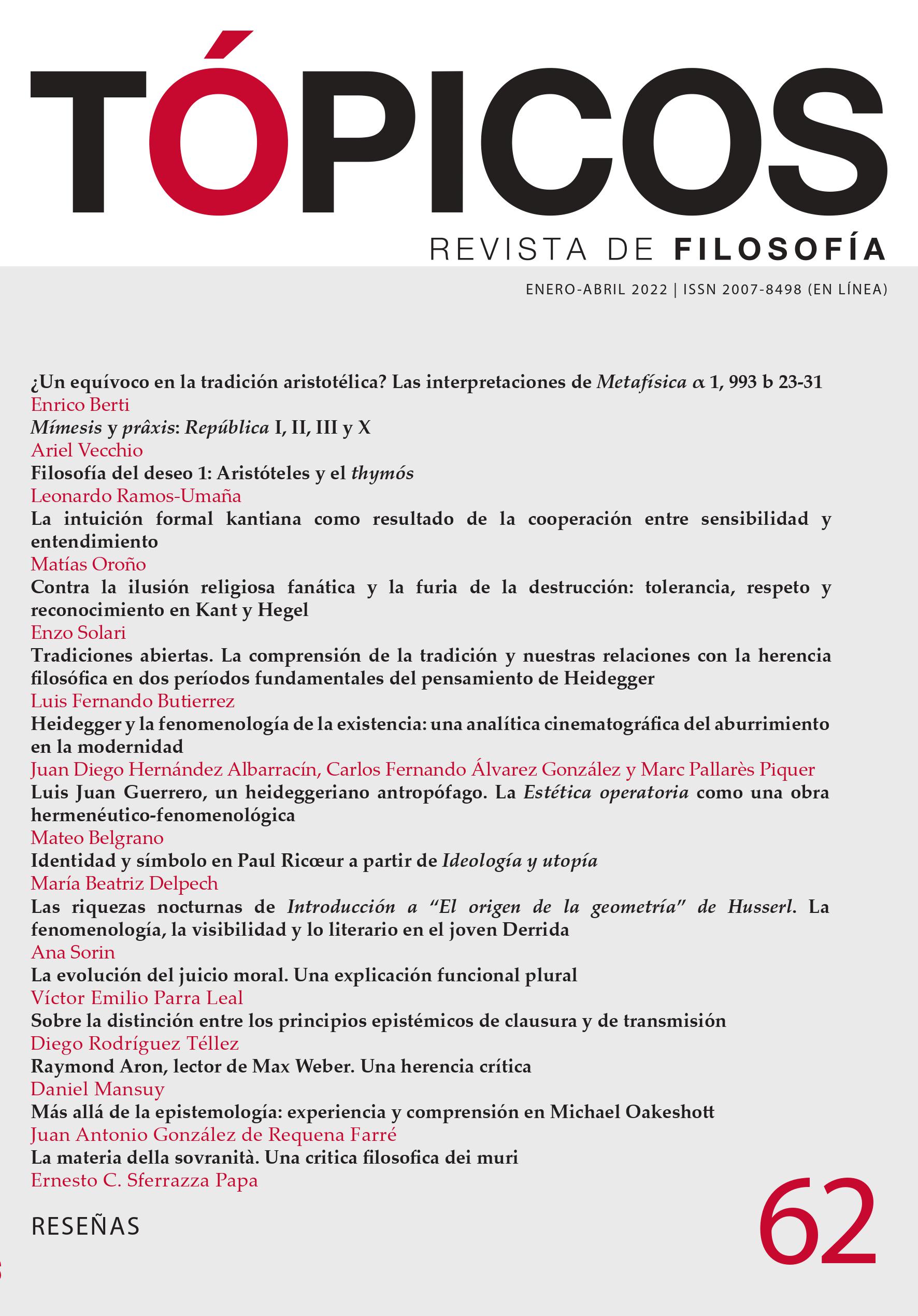Publicado 2021-12-11
Palabras clave
- thymós,
- incontinencia,
- Aristóteles,
- responsabilidad moral
Derechos de autor 2021 Tópicos, Revista de Filosofía

Esta obra está bajo una licencia internacional Creative Commons Atribución-NoComercial-SinDerivadas 4.0.
Cómo citar
Resumen
A fin de clarificar qué es exactamente el fenómeno humano de la akrasía o incontinencia en sentido pleno (a saber, aquella por causa de la epithymía o apetito), en Ética nicomaquea VII.4-10, Aristóteles presenta la incontinencia por analogía, es decir, aquella por causa del thymós o coraje. A pesar de su intención, la explicación de la segunda solamente enreda la comprensión de la primera, y el lector termina por no tener clara ninguna de las dos. El propósito de este escrito es proporcionar algunas luces al tema de la akrasía por thymós, concretamente, intentando resolver tres incógnitas: (1) ¿qué es, exactamente, esta pasión? (2) ¿Quiénes son peores, quienes se dejan llevar por sus apetitos (como los que actúan mal por lujuria o gula) o quienes se dejan llevar por su coraje (como los que actúan mal por ira o celos), y por qué? Finalmente, (3) ¿somos responsables por los errores que lleguemos a cometer en un arrebato de ira?
Referencias
- Aristóteles. (1903). Ethica Nicomachea [EN]. F. Susemihl y O. Apelt (eds.). B.G. Teubner.
- Aristóteles. (1925). Ethica Nicomachea. W. D. Ross (trad.). Oxford University Press.
- Aristóteles. (1982). Tópicos [Top.]. En Tratados de lógica. (Órganon). I. Categorías. Tópicos. Sobre las refutaciones sofísticas (pp. 89-306). M. Candel Sanmartín (trad.). Gredos.
- Aristóteles. (1999). Nicomachean Ethics [EN]. T. Irwin (trad.). Hackett Publishing Company.
- Aristóteles. (2002a). Ética a Nicómaco [EN]. Edición bilingüe. J. Marías y M. Araujo (trads.). Centro de Estudios Políticos y Constitucionales.
- Aristóteles. (2002b). Ética eudemia [EE]. C. Megino Rodríguez (trad.). Alianza.
- Aristóteles. (2002c). Nicomachean Ethics [EN]. S. Broadie y C. Rowe (trads.). Oxford University Press.
- Aristóteles. (2003). Retórica [Rhet.]. Edición bilingüe. A. Tovar (trad.). Centro de Estudios Políticos y Constitucionales.
- Aristóteles. (2004). Problemas [Probl.]. E. Sánchez Millán (trad.). Gredos.
- Aristóteles. (2005). Política [Pol.]. Edición bilingüe. J. Marías y M. Araujo (trads.). Centro de Estudios Políticos y Constitucionales.
- Aristóteles. (2010). Acerca del alma [DA]. M. Boeri (trad.). Editorial Colihue.
- Aristóteles. (2014). Nicomachean Ethics [EN]. C. D. C. Reeve (trad.). Hackett Publishing Company.
- Diels, H. y Kranz, W. (1968). Die Fragmente der Vorsokratiker. Weidmann.
- Feldblyum, V. (2016). Aristotle on Thumos and Phantasia. Ithaque, 18, 1-23.
- Fisher, N. R. E. (1976). Hybris and Dishonour: I. Greece & Rome, 23(2), 177-193.
- Fortenbaugh, W. (1970). Aristotle’s Rhetoric on Emotions. Archiv für Geschichte der Philosophie, 52(1), 40-70. Harris, W. V. (1997). Saving the φαινόμενα: A Note on Aristotle’s Definition of Anger. The Classical Quarterly, 47, 452-454.
- Liddell, H. y Scott, R. (1996). A Greek-English Lexicon. Oxford University Press.
- Real Academia Española. (2021). Coraje. En Diccionario de la lengua española. Versión 23.4 en línea. Fecha de consulta: 15 de enero del 2021. URL: https://dle.rae.es/coraje?m=form.
- Ramos-Umaña, L. (2019). Sobre la reformación del carácter en la obra de Aristóteles. Open Insight, 10(18), 11-42.
- Ramos-Umaña, L. (2022). Proaíresis en Epicteto. NOVA TELLVS, 40(2), [EN PRENSA].
- Vigo, A. (2006). Estudios aristotélicos. Ediciones Universidad de Navarra.





